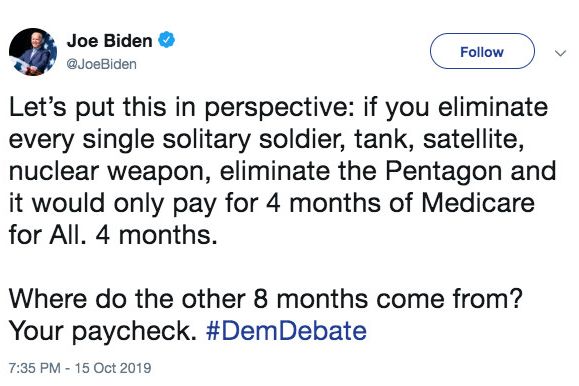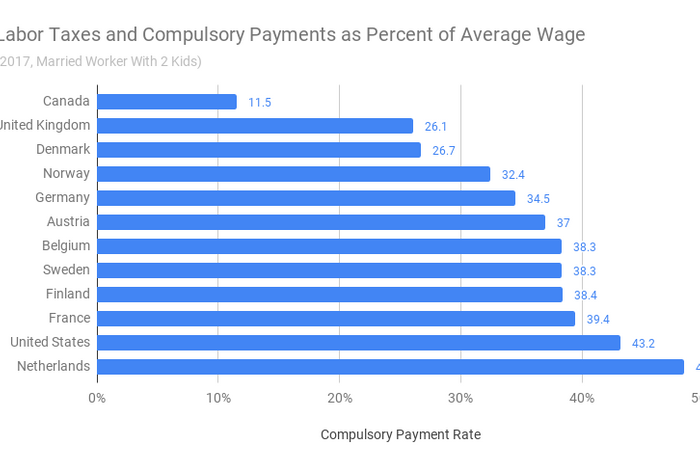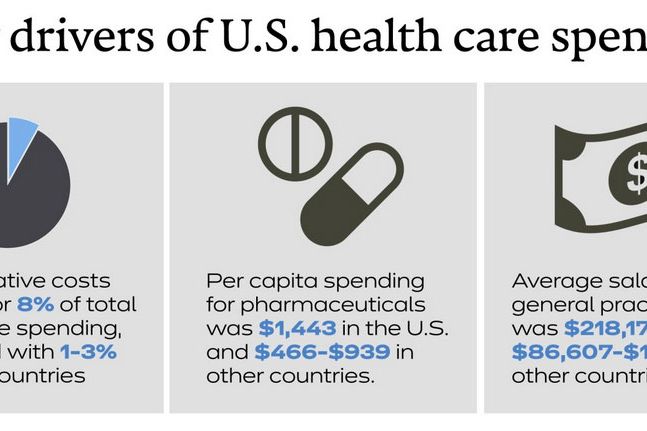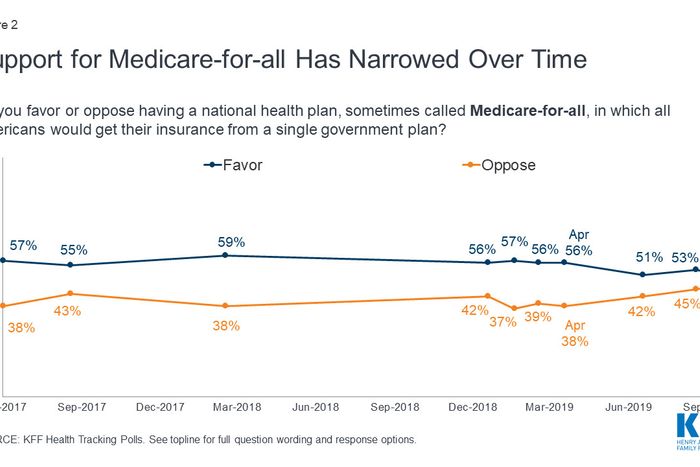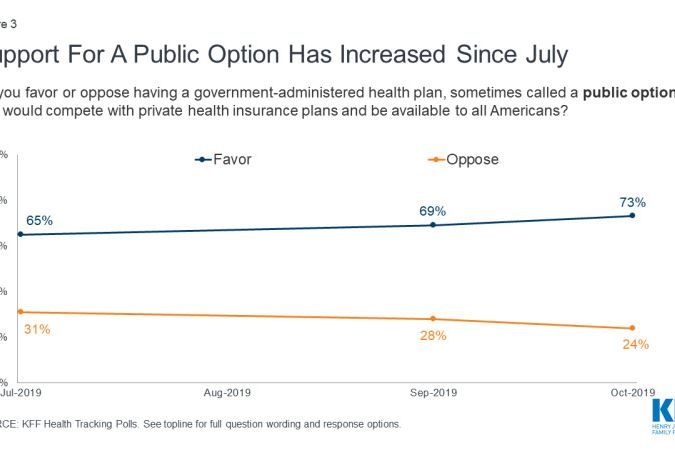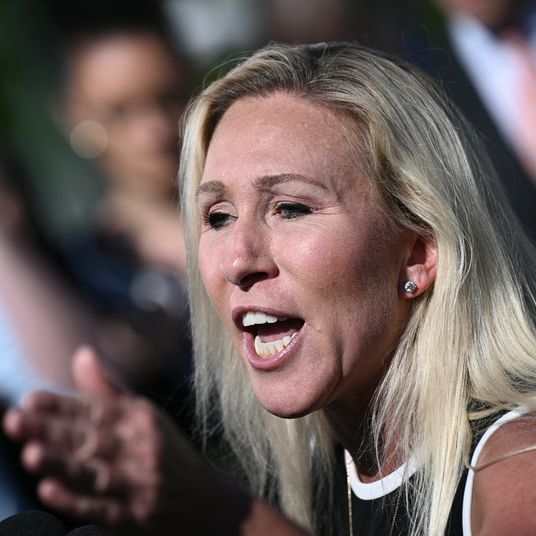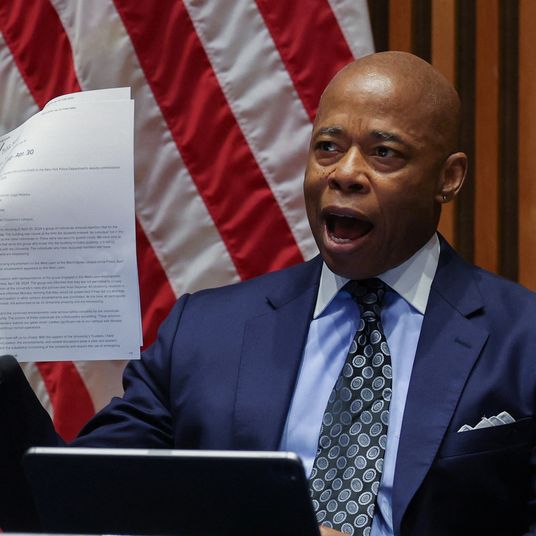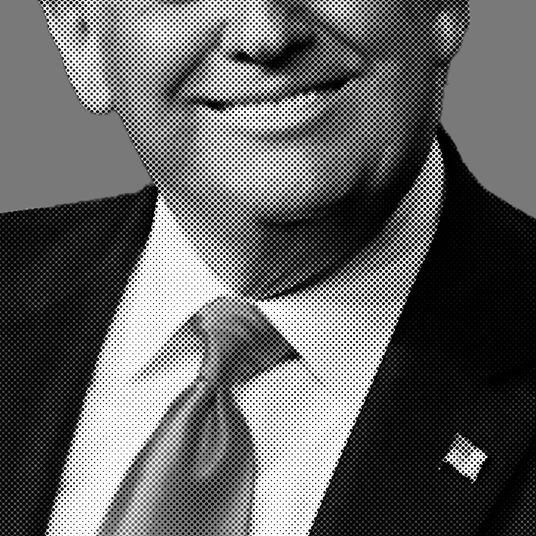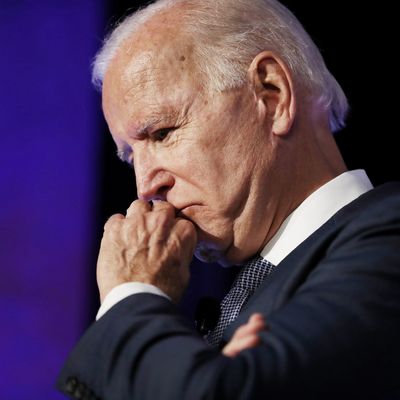
Joe Biden has a dire warning for voters who’ve been seduced by single-payer advocates’ sweet nothings: In Bernie Sanders’s socialist dystopia, the typical American worker would see a small percentage of her income deducted from each paycheck, so as to finance her health-insurance coverage.
The Biden campaign disseminated this harrowing prophecy over Twitter, during Tuesday night’s Democratic debate:
Biden’s framing certainly makes Medicare for All sound prohibitively expensive. But let’s follow the former vice-president’s lead, and put this matter in perspective.
In 2018, Canada spent roughly 11 percent of its GDP on health care. Under its single-payer insurance model, that investment was enough to provide every Canadian with premium, free access to the world’s 14th-highest-performing health-care system.
That same year, the United States spent 18 percent of its GDP on health care — which, under our system, was inadequate to provide any form of insurance to nearly 30 million Americans, nor to prevent 50 percent of our people from delaying or forgoing medical care due to affordability concerns. For these reasons, among others, America’s exorbitant investment in its medical sector has bought us the world’s 29th-ranked health-care system. That places the wealthiest country in human history just behind the Czech Republic on the small matter of caring for its ill.
Unlike Canadian citizens, Americans do not have to pay taxes to support a universal public insurance system. But that 18 percent of GDP doesn’t come from nowhere. The vast majority of U.S. adults see health insurance as a mandatory expense. As a practical matter, their private insurance premiums function as de facto taxes — obligatory payments deducted from their paychecks to finance a form of social protection. As a legal matter, meanwhile, U.S. federal law still mandates that all Americans secure insurance coverage (although the penalty for not doing so has been set to zero). Thus, in both an essential and technical sense, the typical American worker is compelled by government policy to fork over a hefty percentage of their wages to private insurers.
If Biden acknowledged this reality — which is to say, if he ignored the superficial distinction between payroll taxes and premium payments — he would find (presumably, to his horror) that the U.S. already taxes labor income at one of the highest rates of any country in the OECD. As Matt Bruenig of the People’s Policy Project has shown, the “compulsory payment rate” for a married U.S. worker with two kids was 43.2 percent in 2017; for an analogous Canadian, that rate was 11.5 percent.
No honest observer can look at this data and conclude that single-payer health-care systems are inherently more expensive and inefficient than America’s existing model. Which means that the eye-popping price tag of Bernie Sanders’s Medicare for All plan does not reflect the steep price of socialized medicine, per se. Rather, it reflects the fact that America’s aberrant refusal to impose price controls on its health-care industry has enabled the sector to extract an ever-higher share of national income. Americans spend several times more than their peers in other developed countries on health-care administration, pharmaceuticals, and physicians’ salaries. Although the existing Medicare for All proposals would create some cost savings, they would not fully rectify our overspending problem in the near term. This is, in part, because bringing our payment rates all the way down to the international median in one fell swoop would risk hospital closures and other economic disruptions (and spur massive resistance from powerful and respected interest groups). For these reasons, any plausible proposal for shifting all of America’s health-care costs onto Uncle Sam’s books is bound to look fiscally extravagant. But leaving those costs off the government’s ledger doesn’t make them disappear.
As the right-wing Mercatus Center (accidentally) revealed last year, under one plausible model, Bernie Sanders’s Medicare for All plan would cost the U.S. $32.6 trillion over a decade — while simply maintaining our existing health-care system would cost $34.65 trillion. Which is to say, establishing single-payer would save us $2 trillion in national income, while guaranteeing all Americans affordable health care. But it would also require U.S. workers to make compulsory social insurance payments to the government rather than to private insurers.
And for Joe Biden, that’s apparently a deal-breaker.
At this week’s debate in Ohio, Biden and other moderate Democrats hammered Elizabeth Warren for refusing to state explicitly that her Medicare for All plan would require raising taxes on the middle class. The Massachusetts senator did not deny that her proposal would involve such tax hikes. But she refused to utter the T-word. Instead, she merely promised that she would never sign a health-care bill that didn’t lower the middle-class’s overall costs.
It was more than fair for the debate moderators to press Warren on her evasiveness. Journalists should always work to expose the trade-offs inherent in politicians’ proposals. But Warren’s caginess was rooted in the media’s failure to apply such scrutiny universally. Democrats campaigning on plans that would retain America’s redundant insurance bureaucracies were not asked how they could justify such an extravagance. Under the norms of mainstream political journalism, costs imposed on the American people by the private sector require no justification or defense; only costs imposed by the public sector do. If you are committed to abetting the meteoric rise of private health-insurance premiums, a debate moderator will not ask you to level with the American people about how much your approach to health-care policy will cost them. If you are committed to reducing overall health-care costs by expanding the public sector’s role in medical provision, you will be ritually scolded for the extraordinary (and extraordinarily decontextualized) fiscal price of your program.
As the party that favors higher levels of taxation and public provision, Democrats have an interest in contesting this norm. Biden’s agenda may be less ambitious than Sanders or Warren’s. But he still (officially) aims to raise taxes and increase spending by trillions of dollars. A political discourse that treats taxation as presumptively suspect (even as it treats private rentierism as presumptively legitimate) will not be a favorable one for any Democratic president. Amy Klobuchar, who criticized Warren for her secret middle-class tax hike Tuesday night, is a co-sponsor of the Family and Medical Insurance Leave Act, which would finance an entitlement to paid family leave with a small increase in payroll taxes. When the Klobuchar administration pushes for that law’s passage, it will want its policy to be judged on the basis of its impact on the median family’s overall costs, not their overall tax bill. And yet, in attacking single-payer Tuesday night, Klobuchar implicitly endorsed the opposite criterion. Equating support for middle-class families with opposition to increasing their tax rates is a conservative project. There is no reason for any Democratic candidate to be advancing it — no matter their position on single-payer.
There are arguments against the existing Medicare for All proposals that do not involve demonizing the very concept of tax-financed social programs. Some of these are logistical (Sanders has neglected to detail various aspects of his transition plan). The most compelling, though, is purely political. At present, there are 14 votes in the U.S. Senate for Bernie’s single-payer bill. In the best-case scenario, Jon Tester will be the pivotal vote in the upper chamber in 2021. Given these facts, there is little basis for believing that Medicare for All will be legislatively viable in the medium-term future, no matter who wins the 2020 election. After all, six-year terms, sky-high renomination rates, and an avalanche of industry cash will insulate anti-single-payer Senate Democrats incumbents against popular pressure in support of the proposal.
And there’s no guarantee that popular pressure would be forthcoming. The vast majority of available polling indicates that a public option is much more popular with voters than single-payer. One can reasonably attribute this result to the aforementioned biases in our political discourse. But no Democratic nominee will be able to eradicate those biases next summer.
If Medicare for All is not legislatively viable and a public option is more electorally expedient, then there is a case for the Democratic nominee to campaign on the latter. After all, the stakes of denying Donald Trump a second term are extremely high. How one calculates the potential electoral cost of running on a somewhat less popular health-care policy — let alone how one weighs that cost against the potential long-term benefits of popularizing single-payer (a more efficient and just mode of health-care provision) — is inescapably subjective. But given the balance of forces in the Senate, deferring to public opinion on health care so as to maximize the probability of Trump’s eviction from the White House next year, strikes me as a choice a genuinely progressive politician could make.
There is no electoral argument, however, for engaging in anti-tax demagoguery. Biden could emulate his old boss and endorse single-payer in principle, but insist that the country is not yet ready for it. Or he could steal Mayor Pete’s line, and say that he trusts the American people to eventually discover the superiority of publicly provided insurance, once they’re given the option. Instead, he’s opted for a needlessly reactionary mode of attack that will damage Warren or Sanders electorally, should they win the nomination, and undermine any future Democratic president legislatively, should the party regain the chance to govern.



